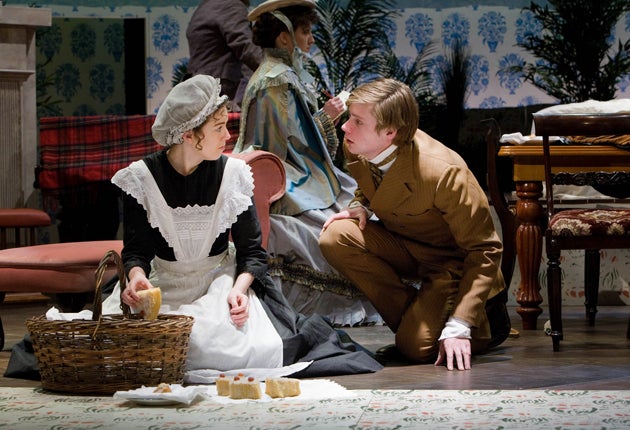Andersen's English, Hampstead Theatre, London

Sebastian Barry's subtle, speculative new play takes off from a sad yet amusing real-life circumstance.
In the spring of 1857, the Danish fairy-tale writer Hans Christian Andersen made an unannounced – and, as it turned out, over-extended – visit to the teeming family home of Charles Dickens, at Gad's Hill. The great novelist, in mourning for a close friend (Douglas Jerrold), was arranging to break off relations with Catherine, his wife and the mother of his many children. His platonic adoration of her sister, Georgie, was on the point of being demoted by the secret love of his life, the young actress Ellen Ternan.
Barry's play picks up on the fact that Andersen was a weird kind of witness to this marital break-up, in that his grip on the English language was so slight. He was also an eccentric whose fears extended to bringing a rope with him for use in case of fire and, as a homosexual, he may have had more than a writerly crush on Dickens.
In Max Stafford-Clark's quirky and compassionate production, Andersen's outsider status is emphasised by the casting of the excellent black actor Danny Sapani. He cuts the figure of a frowning, overgrown baby – as David Rintoul's over-bearing control-freak of a Dickens comments, entertaining him is like having "another child – an elderly, lunatic child" on the premises.
Andersen's visit does not force any of the issues to a crisis. Instead, it sets up patterns of similarity and contrast. For example, bonds that are either unspoken or clumsily articulated are established between the guest and Dickens's wife, sensitively delineated in Niamh Cusack's beautiful performance, and Lisa Kerr's likeably forthright Aggie, a young Irish maid pregnant by Walter, Dickens' teenage son.
Stafford-Clark makes the most of the mood-piece aspect of the play – immuring all of the proceedings in a large Victorian domestic interior, so that a walk uphill for a family picnic lunch becomes a faintly surreal, Alice-style trek over the furniture. This tactic serves to underline how, in an effort to evade his demons, Dickens has become the tyrannously selfish stage-manager of his own life. But there is also the feeling that the material would work best as one of Barry's excellent novels with the same events seen, Virginia Woolf-style, from shifting points of view.
To 8 May (0207 722 9301 Hampsteadtheatre.com)
Join our commenting forum
Join thought-provoking conversations, follow other Independent readers and see their replies
Comments
Bookmark popover
Removed from bookmarks